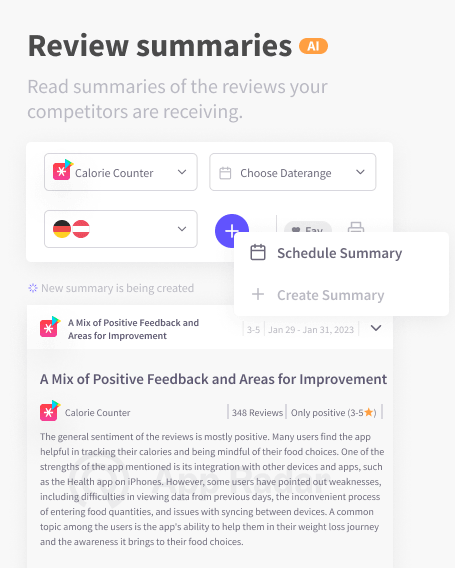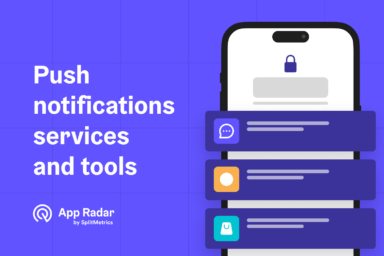Google Play Store and Apple App Store fees, (+12 other stores)
If you want to make your app available for download for a global audience, you need to list it in app stores. Now, most app stores charge a fee on paid apps and in-app purchases. As a typical middleman, they take a cut of the app revenue for facilitating your app distribution. That’s how app stores make their money.

In this post, we’re taking a look at Apple App Store fees, Google Play Store fees, and highlight fees for some other bigger app stores.
How do Google Play Store and Apple App Store make money?
The standard commission rate for distributing your app seems to be 30%, but each app store also has its exceptions. More precisely, the app store revenue comes from taking a commission on:
- in-app purchases;
- subscriptions;
- downloading paid apps.
Note: In-app purchases (IAP) include any transactions performed inside the app except the purchase of physical goods, like booking a flight in a travel app. If you use advertising inside your mobile app as your app monetization strategy, then app stores cannot charge you for that.

Apple App Store fees
App distribution via Apple App Store gives access to over a billion customers in 175 countries and regions on iPhone, iPad, Mac, Apple TV, and Apple Watch. There are no hosting fees, but there’s an annual fee of $99 for the Apple Developer Program ($299 for the enterprise version). And Apple will take a share of your app revenues.
So how much percentage does Apple take from your app revenue? Until November 2020, it was a 30% commission from the total price of all paid apps and in-app purchases from the App Store. However, since then, two rates can apply:
- 30% share when you make more than $1 million in annual net app revenue;
- 15% share when you:
- make less than $1 million in annual net app revenue;
when you’re new to the App Store; - you’re after 12 months of service in the App Store with a subscription-based app.
- make less than $1 million in annual net app revenue;
Note: Apply for the App Store Small Business Program that was started on the 1st of January 2021 in order to qualify for the 15% app store commission fee. According to Sensor Tower, an estimated 98% of app developers should be eligible for this.
If you’re wondering how Apple makes sure to get a share of your app revenue, then here’s the answer:
Interesting fact: Apple’s advertising revenue is on an impressive trajectory, expected to reach $13.7 billion by 2027, according to Statista. This highlights the growing importance of Apple Search Ads for acquiring high-quality users. SplitMetrics Acquire Starter Plan allows you to harness the full potential of this channel. Try it now for free to automate bid adjustments, fine-tune campaigns for the conversions that are most relevant to your business, streamline campaign reporting, and much more.
Google Play Store fees
Google takes a 30% share of your app revenue as well, and also Google’s cut on your revenue for subscriptions decreases to 15% after a year. There’s also a one-time $25 registration fee for the developer account. Make sure to understand the financial aspects of your app model and how it impacts your Google Play Store optimization strategy.
Just like Apple, also Google makes sure to legally oblige you to give a share of your app revenue. Here’s a snippet from Google’s guideline:
Interesting fact: Just before Christmas 2020, a lawsuit against Google’s app store fees was being prepared; read more here.
Google and Apple fee comparison with other app stores
In the table below, you’ll find commission levels of 12 other app stores so you can compare their charges with Google and Apple app store policies.
| APP STORE NAME | COMMISSION LEVELS |
| Apple App Store (app store for Apple devices | ▪ 30% for apps and in-app products ▪ Except 15% for subscriptions after 12 months ▪ $99 annual fee for the Apple Developer Program ▪ $299 annual fee for enterprise version |
| Google Play Store (app store for certified Android devices) | ▪ 30% for apps and in-app products ▪ Except 15% for subscriptions after 12 months ▪ One-time $25 registration fee for a developer account |
| Amazon Appstore (app store for Amazon and Android devices) | ▪ 30% for apps, in-app products, and in-app subscriptions ▪ Except 20% for movies and TV in-app subscriptions ▪ 30% of PC games and software retail price (or 80% of the list price if less) |
| Samsung Galaxy Store (app store for Samsung devices) | ▪ 30% (or otherwise agreed-upon rate) |
| Microsoft Store (digital content store for Windows devices) | ▪ 30% of net receipts for games and in-app products in games ▪ 30% of net receipts for purchases in Microsoft Store for Business, Microsoft Store for Education, Microsoft Store on Windows 8 and Windows Phone 8 devices ▪ 15% of net receipts for all other products ▪ One-time registration fee of $19 for individual developer accounts and $99 for company developer accounts |
| Aptoide (open sources app store for Android devices) | ▪ 25% for certified publishers (or otherwise agreed upon rate) |
| LG SmartWorld (app store for LG devices) | ▪ 30% (or otherwise agreed upon rate) |
| MyApp (Tencent's app store for Android devices) | ▪ 55% for games ▪ 30% for new Tencent games starting 2019* |
| Huawei AppGallery (app store for Huawei devices) | ▪ 50% for game in-app purchases ▪ 30% for paid downloads and non-game in-app purchases ▪ 20% for education apps ▪ 30% for new Tencent games starting 2019* |
| OPPO Software Store (app store for OPPO devices) | ▪ 52.5% for games |
| Qihoo 360 (app store for Android devices) | A tiered structure for games, calculated monthly: ▪ 20% below ¥100,000 ▪ 40% from ¥100,000 to ¥1,000,000 ▪ 60% from ¥1,000,000 to ¥5,000,000 ▪ 64% over ¥5,000,000* ▪ 30% for new Tencent games starting 2019 |
| Vivo App Store (app store for Vivo devices) | ▪ 52.5% for games |
| MIUI App Store (app store for Xiaomi devices) | ▪ 50% for games ▪ 30% for new Tencent games starting 2019* |
| MM Store (China Mobile's app store for Android devices) | ▪ 52.5% ▪ +23.75% commission for promotion options |

Summary of app store fees
Most app stores take a 30% commission on app revenues from in-app purchases, subscriptions, and paid app downloads. As typical middlemen, that’s the way they make their money.
If you’re just getting started with your app distribution, do reach out to App Radar’s team! Our experts are here to prepare your app store launch so that you can start making app revenue faster.



